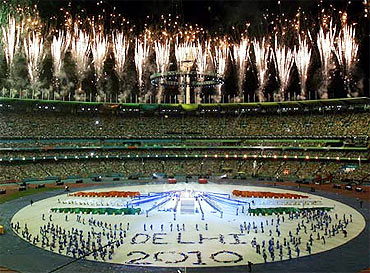
Are mega sporting events money spinners or are they a drain on the national exchequer?
Several nations have in the past borne the brunt of mounting debt arising from organising mega events like the Olympics. The financial crisis in Greece is attributed to the 2004 Athens Olympics.
Big events like Commonwealth Games impact prices of basic commodities like land, rent and transportation, raising the average cost of living, says a study by Hazards Centre.
"Within the next 25 to 30 years of the 2010 Games each resident of the city will have to pay a debt in the form of increased prices of land, basic commodities, petrol," Dunu Roy of Hazards Centre said.
Wipro chairman Azim Premji has also criticised Indian government's move of spending a whopping Rs 28,000 crore (Rs 280 billion) -- some say the spending is over Rs 35,000 crore (Rs 350 billion) -- on the Commonwealth Games.
Premji says this money could have bee used for setting up schools and health centres in thousand of villages across India. He has lashed out against the government for spending on a grand sporting event when the country remains poor despite the economic growth.
Click NEXT to read how mega sporting events have led to huge debts . . .
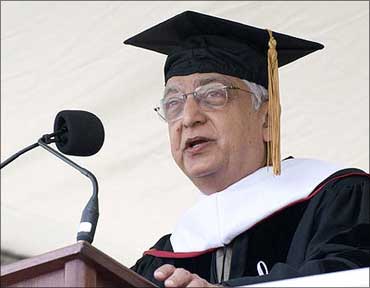
Former minister Mani Shankar Aiyar has also questioned the rationale behind the Indian Olympic Association and Delhi government's extravaganza, saying the money could be better spent on developing sporting infrastructure across the country.
"If we had invested Rs 35,000 crore (Rs 350 billion) for providing games facility for 90 per cent of our children who have no access to them, tomorrow we would be winning all the medals in the world. But so long as you go on spending thousands of crore (billions) on circuses like this and totally ignore the aam bachcha (common child), there is no hope," said Aiyar recently said.
The Bharaitya Janata Party has alleged that the Delhi government diverted funds meant for the welfare of Scheduled Castes for the Commonwealth Games.
Meanwhile, key projects have already missed their deadlines and the mega sports city is yet to be completed.
. . .
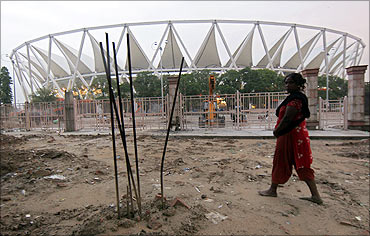
"The cost of renovating the Jawaharlal Nehru Stadium was pegged at Rs 961 crore (Rs 9.61 billion). Rs 669 crore (Rs 6.69 billion) was needed for Indira Gandhi Stadium, Rs 262 crore (Rs 2.62 billion) for Dhyan Chand Stadium and Rs 149 crore (Rs 1.49 billion) the Karni Singh Shooting Range," senior party leader Sitaram Yechury recently pointed out calling for an in-depth inquiry into the costs.
The total renovation cost for the CWG is Rs 4,459.48 crore (Rs 44.59 billion), which is a huge amount, Yechury observed.
These mega events are organised in the hope of generating huge revenues. With the country investing in the new infrastructure, it is expected to gain more businesses and tourists.
Organisers often highlight the advertising revenues and international exposure as the benefits that follow. The Indian government has also made tall claims that the CWG would bring huge profits for Delhi, the Indian capital.
A report by the India chapter of Housing and Land Rights Network, which is an arm of Habitat International Coalition, predicts that the Games would leave behind a 'severe financial legacy'.
. . .

In fact in all host cities, such mega sporting events are taken up on the promise that profits would be generated, says the Hazards Centre study.
Suresh Kalmadi, the Indian Olympic Association president, who is all set to bid for the 2016 Olympics in New Delhi, feels the city would have the necessary infrastructure following the 2010 Games.
He asserts, "We will make double the money that we will spend. It is a win-win situation for the host country."
But have other global cities that played host to the CWG and the Olympics recovered the costs?
Click NEXT to find out . . .

These host countries come under severe debt. And the victims in the debt trap are the ordinary citizens, who in turn pay higher taxes for years to make up for these colossal losses.
Taxpayers are in fact legally responsible for any debt left over from the Olympics. The host governments sign this contract with the Indian Olympic Committee. They are required to assume full financial responsibility for any cost overruns, says the Hazards Centre's study on Commonwealth Games.
Privatise the profits and socialise the losses, seems to their mantra. The truth of each mega event lies buried beneath a mass of concealed subsidies, unaccounted expenditures, creative book-keeping, and massive branding exercises, the study adds.
. . .

Here's a look at cities that lost billions hosting mega sporting events:
Munich Olympics, 1972
The city lost more than $1 billion hosting the Games.
Montreal Olympics, 1976
The Montreal Games turned out to be a massive financial nightmare for Quebec. They were the most expensive Games ever organised as Quebec was built for the Games.
The price tag for hosting the Games was originally estimated at $310 million, but the costs jumped to almost four times, up to $1.2 billion, because of bad management, poor planning, and corruption.
Montreal's expensive Olympic stadium was budgeted to cost only $200 million, but the final bill was pegged at $2.4 billion.
The Canadian government lost millions of dollars by building many other facilities that were not used again and were expensive to maintain. This resulted in a whopping $1 billion deficit.
. . .

Summer Olympics, Seoul, 1988
The actual cost of the Seoul Olympics stands at more than 11 billion Euros. The extra amount covers infrastructure projects and other indirect public sector expenditures not included in the original Olympic budget, points out the Hazards Centre study.
Winter Olympics, Calgary, 1988
The Calgary Winter Olympics were initially estimated to cost $461 million. The total cost, however, came to $1 billion. Debt came to $910 million.
The Olympic facilities, which lay unused later, included a $98 million Olympic Saddledome Stadium, a $72 million Olympic Park, ski jumping and skiing facilities, and a $59 million media village that had apartment blocks of 266 residential suites.
. . .
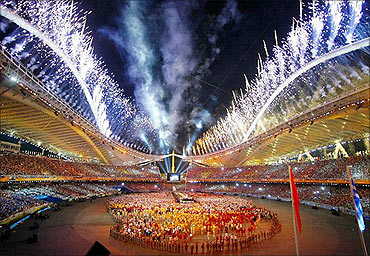
The Salt Lake Winter Olympics resulted in a $155 million deficit. The total cost came to $3 billion.
Athens 2004
The Athens Olympics is considered one of the most expensive Games in the history of Olympics. At the time of their bid in 1997, the budget was just $1.3 billion.
In 2000, this figure zoomed to $5.3 billion. In April 2001, the Greek finance ministry increased the estimate to $6.2 billion. But actually, it was between $15 and $20 billion, many times the original target.
The spiralling costs caused massive public debt said to be in the range of around $16.6 billion that still continue to haunt taxpayers. The deep recession that Greece has been ravaged by owes its origin to this massive debt.
. . .
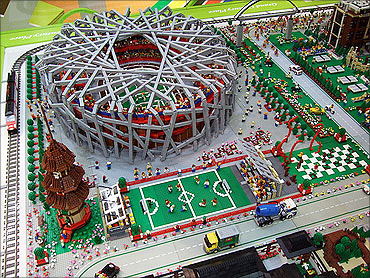
The Beijing Olympics saw a whopping spend of $40 billion for its 2008 Olympics. Its original operating budget was $1.609 billion but in the course of building expressways, modern stadia and related infrastructure, the cost shot up.
London 2012
For the London Olympics of 2012, the cost could rise by up to 180 million pounds due to a fall in property values.
Quarterly accounts from Olympic Delivery Authority (ODA) state that officials expect to make 150 million pounds less from the sale of land after the Games because of the credit crisis.
The English taxpayers have been warned that there is no limit on the amount they may be expected to pay if costs go up for staging the Games.
. . .

The first Commonwealth Games at Hamilton in 1930 are reported to have cost about $45,000. At Edinburgh in 1986, the CWG was estimated to cost $14 million, with a deficit of $4.3 million.
Expenses for Games shot up to $54 million for Auckland in 1990 and to $1.2 billion in Manchester in 2002.
The only exception to this trend appears to have been the 1998 Kuala Lumpur Games, held for the first time in Asia, for which the initial bid was $33 million, but the actual costs were not known.
Manchester 2002
The original estimate for the Manchester Games in 1994 was 78 million pounds. By 2001, a year before the Games, the projected cost was 100 million pounds over budget.
Twelve months before the Commonwealth Games in Manchester, the government needed to provide emergency cash injection of 105 million pounds. The actual cost however came to $1.2 billion.
. . .
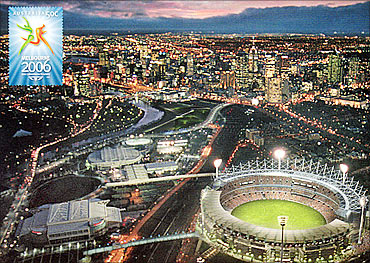
The initial bid for the Games was placed in 1998 at $195 million but by the end of 1999 it had blown up to almost $400 million. Worse was to come in April 2003 when the Australian government admitted that the Games budget had risen to over $1.1 billion. The cost of staging the event had more than doubled!
. . .
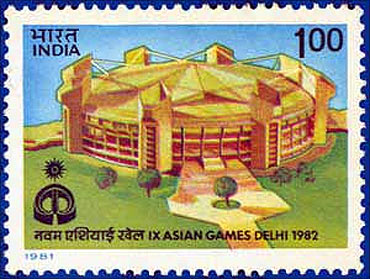
During the Asian Games in 1982, the Jawaharlal Nehru Stadium, the Talkatora Stadium, the Indira Gandhi Indoor Stadium and the Yamuna Velodrome were built. Asiad also saw the development of the Ring Railway and the construction of the suburban transit system.
The Asiad Village, three hotels (Kanishka, Mughal Sheraton and Taj Palace), and four flyovers were also built for the Games. At the same time, the Player's Building, meant as a VIP complex, was never completed, nor was the roof of the Talkatora swimming pool, and the retracting roof of the Indira Gandhi Indoor Stadium never worked properly.
. . .
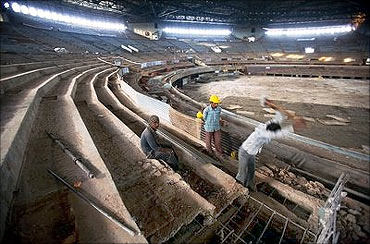
Even after the Games, these facilities remained underutilised. The roof of the Indira Gandhi Indoor Stadium remains leaky and the stadium is actually tilting to one side. Now, crores of rupees are being spent on renovation.
In 1982, the government had planned to raise foreign exchange by selling Asiad Village apartments to Non-Resident Indians (NRIs) but they got a poor response. Finally, public sector companies bought most of the apartments, says the study.
So will it be any different this time around as Delhi readies to host the Commonwealth Games 2010? Will the government be able to recover the colossal cost of staging the Games? Will the newly created or renovated infrastructure be used after the Games are over? Or will we, the taxpayers, have to bear the burden by paying through our noses for what has been described by critics as avoidable expenditure? Only time will tell.
Meanwhile, here's wishing all the success to the Commonwealth Games 2010 that begin on October 3.